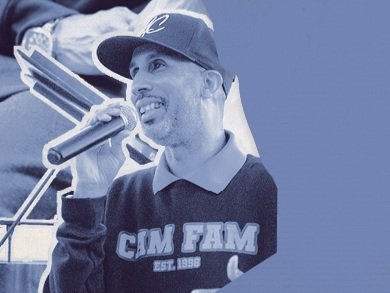Mac Phipps, the artist and activist
James Torgerson / V Mag at UVA
When rapper and artist McKinley “Mac” Phipps Jr. visited the University this fall, his words, presence and performance moved the room. Through a performance at the Sound Justice Lab’s “Technologies of Silence” conference, Phipps shared his story of wrongful conviction that has impacted change around the country in his three years since being released on parole.
In 1997, Phipps signed with No Limit Records and seemed to be on the edge of a successful rap career. A year later, one of Phipps’ singles, “Shell Shocked,” reached #11 on the Billboard Top 200. A young 20-year-old boy from New Orleans was providing for his family, making it big and performing for arenas of 20,000 fans. Soon after this high, disaster struck at one of Phipps’ concerts in 2000 when a young fan was shot and killed. The next day, Phipps found himself in the St. Tammany Parish Sheriff's office charged for first-degree murder — a crime he did not commit.
Throughout the trial, prosecutors and courts made unethical and ill-informed decisions. They ignored witness accounts that would have defended Phipps and ignored when someone else admitted to committing the crime. Phipps said he felt most disrespected by the way the court exploited his lyrics and onstage persona. Prosecution took his works of exaggerated fiction, including two songs from “Shell Shocked” with lyrics like “Murda, murda, kill, kill,” and painted Phipps as an aggressive boy proud of violence. Phipps was found guilty of manslaughter and sent to prison for the next 21 years until, after a long legal battle, he was released in 2021.
Since regaining his freedom, Phipps and his wife, Angelique Phipps, have worked tirelessly to advocate for creative freedom and to inspire the well-being of the next generation of youth. During Phipps’ visit to U.Va., he spoke about his message.
When asked if the trial and time imprisoned changed his outlook on his writing, Phipps gave a flat no.
“Music has saved my life,” Phipps said. “It has been a part of my life for as long as I can remember, so it was only natural that it would be used against me some day.”
In the 21 years Phipps was imprisoned, music remained more than a creative outlet — it was a lifeline. He said even if he wanted to, he could never “turn off” the desire to write and make music. For Phipps, music was a way to express and process every struggle. From a 20-year-old in Louisiana to the 47-year-old man he is today, Phipps said he has returned to his original roots and is making music for himself and others, not for money or what he thinks people want to hear. Much of his newer music pulls from lived experience offers an updated perspective compared to the words of the young boy in New Orleans.
Not only does Phipps aim to share his story, but he works with his wife to protect rappers’ and musicians’ lyrics against the law. On Aug. 1, 2023, thanks to the work of the Phipps, Louisiana passed the Restoring Artistic Protection Act. The RAP Act prevents creative or artistic expression, like lyrics or music videos, from being used in a court to define the defendant's character. California passed a similar bill and Phipps is now working to pass it on the federal list. He said one of the biggest frustrations is the time it takes to pass legislation. Phipps said his work is nowhere near done.
His journey from rising rap star to man unjustly imprisoned and finally activist, is one of inspiration and true love of art. Phipps said if ever stopped writing and creating music he wouldn’t be who he is today. A voice can never be silenced when it has the means to create — he wants to give and protect that gift for people to come.
At the Technologies of Silence conference, Phipps spoke and performed for a crowd of some faculty and staff — but mostly students.
“Any moment I get to share with young people on a journey, I’ll take it, because that’s my way of giving back,” Phipps said.
